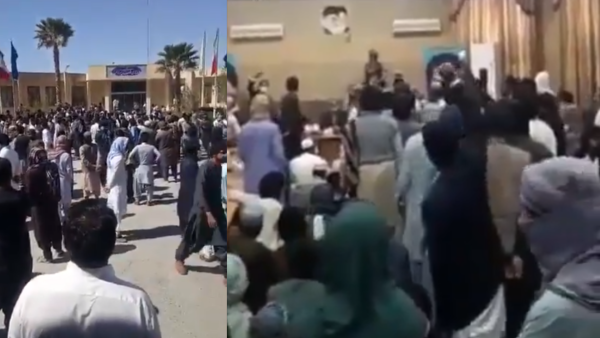Almost a week after Balochi activists reported the killing of a 19-year-old fuel trader in Kouhak-Saravan, pro-Baloch sources are once again reporting attacks on fuel traders in the region, which has urged hundreds of Saravan residents to storm a government building.
⚡️#TweetStorm ⚡️
— mostafa.m (@MostafaMe4) February 23, 2021
Join us and support the Iranian people
To condemn the crimes of the mullahs' regime in #Iran, which fired on 50 deprived Baloch fuel carriers yesterday!
?Tuesday, Feb 23, 2021
⏰5:30 PM CET
⏰11:30 AM EST#StopKillingFuelCarriers pic.twitter.com/lmRFcgKKqE
Across social media networks, activists known for their anti-government views have condemned what they described as "recent violent attacks by the Iranian government on the Baloch minority," saying that they are increasingly being targeted by authorities.
?10 dead and 40 wounded in the Revolutionary Guards shooting at Baloch fuel workers
On the Iran-Pakistan border, the #IRGC attacked #Balochistan youths who live by buying and selling fuel between #Iran and #Pakistan, killing 10 and wounding 40#Iran #IRGCTerrorists pic.twitter.com/SDao5TWTeJ— Daniel (@Danielf188) February 22, 2021
#Baloch people and families of fuel users enter the Saravan governorate building
— abbasali kheirandish (@abbasali210) February 23, 2021
Hundreds of families of Baloch fuel users entered the Saravan governor's office building after popular calls to protest the killing of dozens of Baloch fuel. #IranProtests pic.twitter.com/qEzwB7VTYI
Unconfirmed reports have noted that 10 people are thought to have been killed by Iranian live ammunition during an attack yesterday. However, the Iranian government has provided no commentary on such reports.
Because of poverty and unemployment,many Baloch citizens have to transport fuel on the Pakistani-Iranian borders.
— کمپین فعالین بلوچ (@balochcampaign) February 16, 2021
Online people have explained that Baloch fuel traders are often targeted for their role in selling untaxed fuel to Pakistan and Afghanistan across the eastern border, as a means to afford to live amid extreme poverty and unemployment rates in their region.







